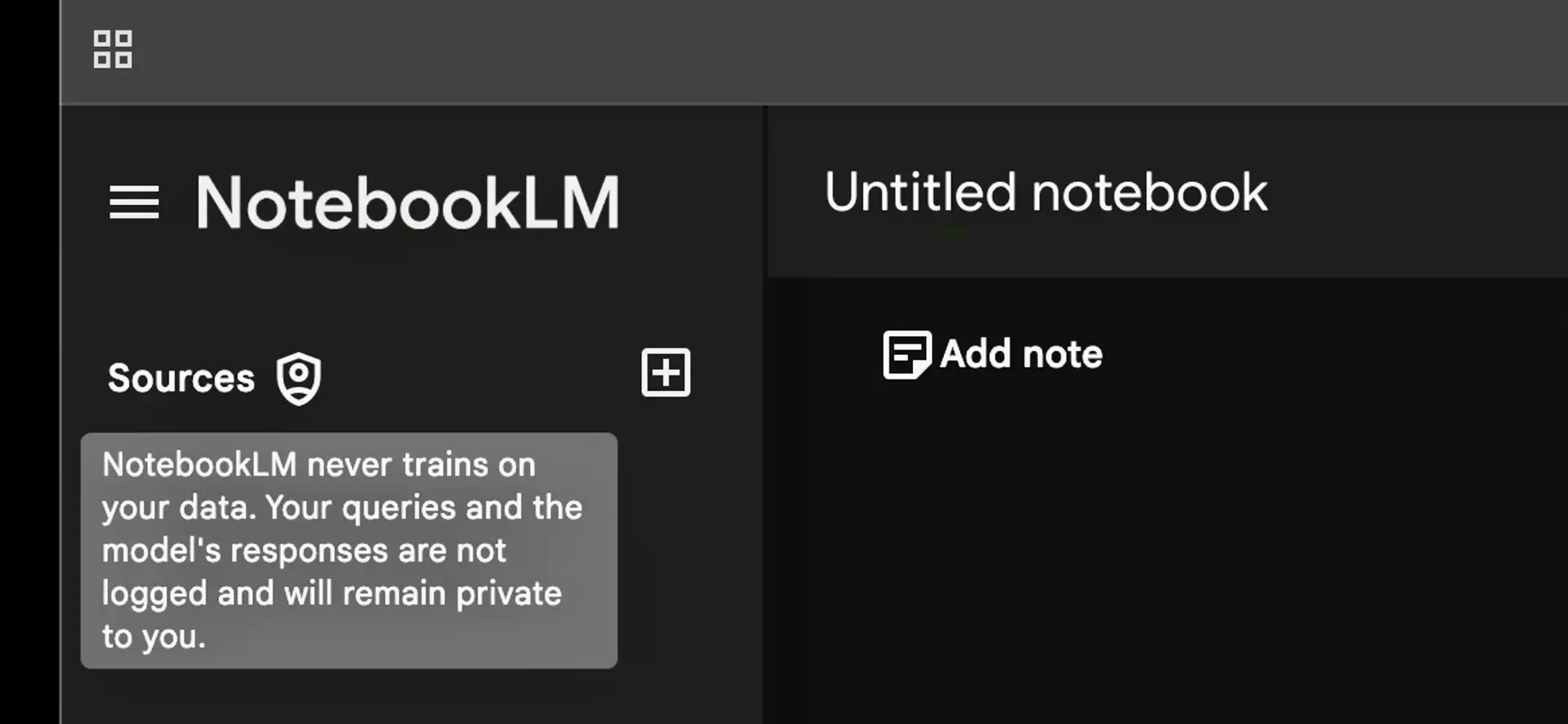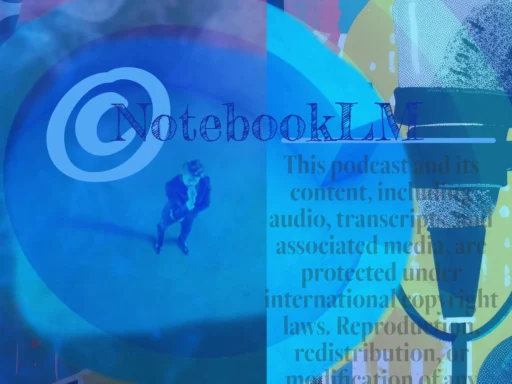NotebookLM and Google Privacy Policies: Ensuring Data Security
Google remains committed to data privacy and security, particularly concerning NotebookLM’s privacy policies.
Though an offshoot of Gemini AI, NotebookLM is built with privacy at its core to ensure that user data remains private. This means that no user data is used for training purposes, and all queries and model responses are kept confidential. Below is a screenshot explaining this privacy commitment.

This screenshot shows a relevant portion of Google’s NotebookLM privacy policy displayed as a tooltip, which is visible when the user moves the cursor over the privacy icon next to the word ‘Sources’.
- NotebookLM never trains on your data. Your queries and the model’s responses are not logged and will remain private to you, as stated in a tooltip on the ‘Add Sources’ button on NotebookLM.
- Gemini AI: In contrast, Gemini AI explicitly uses human reviewers to annotate and process user conversations for the purpose of improving generative machine-learning models. As stated in the Gemini AI policy:
“To help with quality and improve our products (such as generative machine-learning models that power Gemini Apps), human reviewers read, annotate, and process your Gemini Apps conversations. We take steps to protect your privacy as part of this process. This includes disconnecting your conversations with Gemini Apps from your Google Account before reviewers see or annotate them. Please don’t enter confidential information in your conversations or any data you wouldn’t want a reviewer to see or Google to use to improve our products, services, and machine-learning technologies.”
This distinction highlights Google’s effort to balance innovation with privacy safeguards. For NotebookLM users, the commitment to excluding user data from AI training offers an added layer of reassurance compared to Gemini AI’s practices.
Google’s Privacy Policy Explained
Google’s privacy policy, which applies to all its services, emphasizes consistency, transparency, and user control. Key elements include:
- Data Retention: Google retains data for different periods based on its type, usage, and user settings. For example, activity data such as search history might be retained for 18 months by default, while other data, like location history, can be set to auto-delete after 3 or 18 months based on user preferences. Some data is anonymized or automatically deleted after a specified period, while other information can be deleted by users at any time through their account settings.
- Data Sharing: Personal information is only shared when legally required, or to address fraud, security, or technical issues. Google’s policy also protects the rights and safety of its users and the public, ensuring that data is handled responsibly across all services.
- Cookies: Cookies play a vital role in improving the quality of Google’s services and understanding user preferences. However, Google ensures these cookies are only disclosed when legally necessary or as part of its user agreements.
- Privacy Settings: The Privacy Checkup tool empowers users to review and modify their privacy settings, including managing location tracking, ad personalization, and YouTube history. This tool is part of Google’s broader effort to provide users with greater control over their data.
Google’s Adherence to International Privacy Frameworks
Google also adheres to several international privacy frameworks to ensure compliance with global data protection standards. These frameworks include the EU-U.S. and Swiss-U.S. Privacy Shield frameworks, among others, which establish clear guidelines for data transfer and protection across different regions. More details can be found on the Google Privacy Frameworks page. This adherence highlights Google’s commitment to meeting international privacy obligations, reinforcing trust in how user data is managed.

The Bundeskartellamt sign outside the agency’s building, symbolizing its authority in competition regulation, highlighted by the 2023 ruling against Google.
Impact of Germany’s Bundeskartellamt Ruling
In October 2023, Germany’s Federal Cartel Office (Bundeskartellamt) issued a landmark ruling that required Google to give users more control over their personal data. This ruling is significant as it reflects the growing trend of holding tech giants accountable for data privacy, reinforcing the importance of user consent and stricter data protection standards globally. The ruling mandates that Google:
- Obtain explicit user consent before processing personal data.
- Limit data collection to only what is strictly necessary for service delivery.
This decision underscores the growing demand for stronger corporate accountability in managing user data. As a result, Google has introduced enhanced privacy controls that give users—including NotebookLM users—more clarity and autonomy over how their data is handled.
User Empowerment: Privacy Checkup and Transparency Tools
Google’s recent updates place user control at the forefront of its privacy initiatives. For example, the introduction of the Privacy Dashboard allows users to easily view and manage their activity across Google services, providing more transparency and control over their data. The Privacy Checkup tool offers a step-by-step guide to help users manage their privacy settings, including:
- Location Tracking: Users can review and adjust how their location data is collected and used across Google services.
- Ad Personalization: The tool provides granular control over how user data is used for targeted advertisements.
- Data Export or Deletion: Google’s intuitive settings allow users to export their data for personal use or delete it entirely.
These updates align with major data protection regulations, such as the General Data Protection Regulation (GDPR), which mandates transparency and user control. By providing tools that simplify privacy management, Google ensures users retain full authority over their personal information.
Google’s Assurance of User Privacy
Though not included in any official policy, Google reassures its users about their safety and privacy through its Safety Center, available at safety.google, which acts as a hub for security and privacy information. While the Safety Center primarily addresses mature, mainstream products, NotebookLM users are also covered under Google’s privacy policy. This platform offers users insight into how Google is working to keep them safe across different aspects of their online experience.
Google’s Security and Privacy Measures
Google’s Security & Privacy section provides a deep dive into the measures taken to protect user data. By employing technologies such as encryption and Transport Layer Security (TLS), Google ensures that information is securely transmitted. This section also details proactive measures, including automatic threat detection systems and real-time security alerts, to prevent unauthorized access and keep personal data safe.
Google’s Advances in Cybersecurity
The Cybersecurity Advancements section showcases Google’s efforts to protect not just individual users, but also businesses and governments from cyber threats. Built-in security features across Google products are emphasized, as well as Google’s ongoing collaboration with other organizations to advance cybersecurity knowledge. By using artificial intelligenceArtificial Intelligence or AI refers to systems or machines ... and developing cutting-edge technologies, Google aims to stay ahead of constantly evolving cyber threats.
A Holistic Approach to Safety
Together, these assurances made by Google at safety.google reflect Google’s multifaceted approach to ensuring privacy and security for all users. Though these efforts are not formal policies, they show Google’s commitment to making the internet a safer place through proactive measures, user empowerment, and technology advancements.
Why These Changes Matter for NotebookLM Users
For NotebookLM users, Google’s updated privacy measures translate to greater control and transparency. Tools like Privacy Checkup make it easier for users to adjust their settings to match their privacy preferences. Whether you are a consumer or a Workspace user, these updates ensure your data is handled responsibly, in line with international privacy standards.
For advertisers and third-party partners, Google’s changes reinforce the importance of compliance. Companies that fail to meet these standards risk losing access to revenue-generating opportunities on Google’s platforms. This highlights the broader industry implications of Google’s privacy updates, encouraging other companies to adopt similar measures.
Conclusion
NotebookLM users can rest assured that their data is governed by Google’s robust, universal privacy policy, which includes strict data access controls, encryption of data in transit and at rest, and user-friendly privacy tools like Privacy Checkup to enhance transparency and control. These measures include GDPR compliance, user-friendly tools like Privacy Checkup, and enhanced transparency in data handling practices. Moreover, the German Bundeskartellamt ruling and Gemini AI privacy rules provide additional insights into Google’s evolving privacy practices, emphasizing user consent and ethical data handling.
With unified privacy practices across regions, Google demonstrates its commitment to building trust and delivering secure, user-centric services. For NotebookLM users, this means consistent privacy protections regardless of their location, ensuring that their data is always handled with the highest standards. For NotebookLM and beyond, these updates reflect a positive shift towards a more transparent and privacy-conscious digital ecosystem.
Glossary of Key Terms
- Google Privacy Policy: The overarching policy governing how Google handles user data across all its services, focusing on privacy assurances, encryption, and data control.
- Gemini AI: Another AI framework from Google that integrates with various apps and services, involving distinct privacy guidelines including human review and data collection for model improvement.
- Personal Data: Information that can be used to identify an individual, which Google does not use for AI training in NotebookLM, ensuring privacy for Workspace and educational users.
- Human Review: A process in which human reviewers read and annotate user interactions to refine AI models, employed by Gemini AI but not by NotebookLM.
- EU-U.S. and Swiss-U.S. Privacy Shield Frameworks: International agreements that regulate the transfer and protection of personal data between the EU, Switzerland, and the U.S., ensuring compliance with global data protection standards.
- Bundeskartellamt: Germany’s Federal Cartel Office that issued a ruling to require Google to enhance user control over personal data, emphasizing explicit user consent and minimal data collection.
- Privacy Checkup: A tool provided by Google that allows users to manage their privacy settings, including location tracking, ad personalization, and data export or deletion.
- Data Encryption: The process of encoding data in transit and at rest to protect it from unauthorized access, a fundamental part of Google’s data security measures.
- TLS (Transport Layer Security): A security protocol that ensures the safe transmission of data between systems, used by Google to secure user information.
- GDPR (General Data Protection Regulation): European regulation that mandates transparency and user control over personal data, aligning with Google’s privacy policies.
- Safety Center: Google’s platform that provides security and privacy information to users, outlining how Google works to ensure user safety.
- Cybersecurity Advancements: Google’s efforts to protect users, businesses, and governments from cyber threats, using artificial intelligenceArtificial Intelligence or AI refers to systems or machines ... and collaboration with other organizations.







